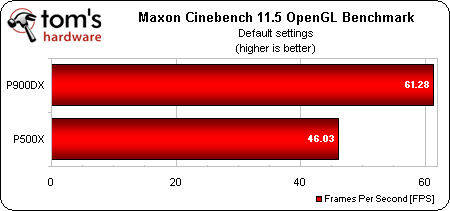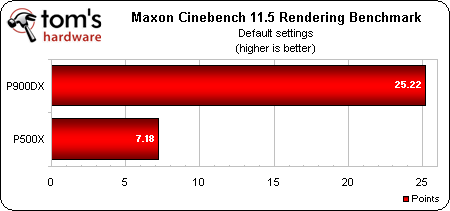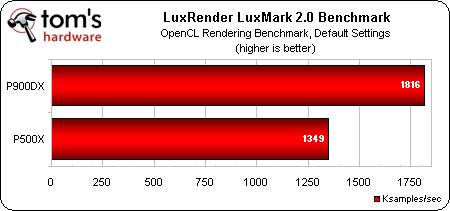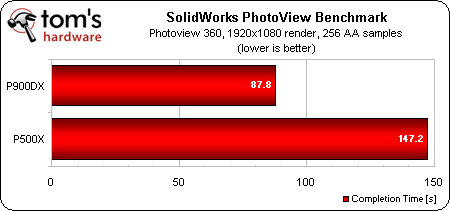iBuyPower P500X And P900DX Workstations, Reviewed
Armed with updated workstation benchmarks, we have two systems from iBuyPower in the lab today: a $2,000 quad-core entry-level rig, and an $8,000 sixteen-core behemoth. With $6,000 separating the two, is the performance spread really what you'd expect?
Rendering And 3D Animation: Cinebench, LuxMark, And & SolidWorks
Maxon Cinebench
Cinebench is a portable benchmark created by Maxon, based off of its Cinema 4D software. Because the test scenes change from revision to revision, it is difficult to compare results between Cinebench versions.
Cinebench OpenGL
The Cinebench OpenGL test plays an animation of a car chase through city streets and records the results in frames per second. The P900DX’s 33% lead in this test is pretty consistent with the other OpenGL performance results we've seen.
Cinebench Rendering
The Cinebench Render test renders a single animation frame using up to 64 threads. It then compares the render time against a 1 GHz baseline machine and reports the score in points, with one point being the score of the baseline machine.
The P900DX has a 3.51x lead over the P500X, which is toward the low end of what we’ve seen from other fully threaded render tests, but still no slouch.
Get Tom's Hardware's best news and in-depth reviews, straight to your inbox.
LuxMark 2.0
LuxMark is an OpenCL benchmark tool created by LuxRender as a promotional tool based on its render engine. It is a freely available benchmarking tool that is cross-platform compatible under OpenCL.
Being entirely GPU-based, LuxMark shows the same results as pretty much every other GPU-based rendering test we’ve run in this article, with the P900DX leading by 34%.
SolidWorks PhotoView 360
Photoview 360 is an application included with SolidWorks to make photorealistic rendered views of CAD models. In this case, we’re looking at a render of a butane lighter.
The P900DX shows 67% faster than the P500X in this test. While this is an improvement, it still falls far short of the performance difference we’ve seen between the two systems in other renderers. Our previous comparison of the Sandy Bridge- and Ivy Bridge-based Xeons show that Ivy Bridge has slightly better performance per-clock. That, combined with the P500X’s higher clock rate, may very well be helping close the gap between the two workstations.
Current page: Rendering And 3D Animation: Cinebench, LuxMark, And & SolidWorks
Prev Page Rendering And 3D Animation: Maya And LightWave Next Page Rendering And 3D Animation: VUE, Blender, And SPECviewperf-
sprucegroose The P900DX would be about $6500 for the parts alone. It also comes with warranty, and if you are the type of person using it, the time building it and repairing it might offset the price difference. On the other hand, you could put in better components for the same price.Reply -
manitoublack We've got the Quadro 4000's at work and they're junk. GTX280 is faster and they were released in 2008. I pulled mine and installed my old GTX295, made a huge difference using the mine modelling software.Reply
Quadrao 4000 was all stutters, GTX 295 is buttery smooth. -
csf60 manitoublackWe've got the Quadro 4000's at work and they're junk. GTX280 is faster and they were released in 2008. I pulled mine and installed my old GTX295, made a huge difference using the mine modelling software.Quadrao 4000 was all stutters, GTX 295 is buttery smooth. that's because workstation cards are not meant to be fast at rendering frames. They are fast at doing many simple batch calculations like ray tracing, fluid movement or video editing.Reply -
j2j663 manitoublackWe've got the Quadro 4000's at work and they're junk. GTX280 is faster and they were released in 2008. I pulled mine and installed my old GTX295, made a huge difference using the mine modelling software.Quadrao 4000 was all stutters, GTX 295 is buttery smooth.Reply
This is like someone complaining that a screwdriver is really bad at pounding in nails. Learn to use the right tools for the job at hand. -
I'm curious about the After Effects performance. What were your memory settings when rendering multiple frames simultaneously?Reply
-
Draven35 they varied, I had to set them between 3gb and the minimum in order to the the maximum number of cores. I have a working theory on the AE problem that i will test next opportunity.Reply -
Wow, odd. Anywhere I could get an update on your progress once you test your hypothesis? I'd love to figure out what is causing that result. It should be destroying that benchmark.Reply



